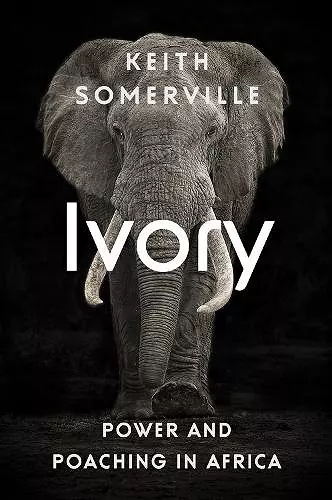Ivory
Power and Poaching in Africa
Format:Hardback
Publisher:C Hurst & Co Publishers Ltd
Published:24th Nov '16
Should be back in stock very soon
This hardback is available in another edition too:
- Paperback£15.99(9781787382220)

Despite the 1989 global ivory trade ban, poaching and ivory smuggling have not abated. More than half of Tanzania's elephants have been killed for their ivory since 2007. A similarly alarming story can be told of the herds in northern Mozambique and across swathes of central Africa. But why the new upsurge? The popular narrative blames a meeting of two evils - criminal poaching and terrorism. But the answer is not that simple.Since ancient times, large-scale killing of elephants for their tusks has been driven by demand beyond Africa's range states from the Egyptian pharaohs through the industrialising West to the new wealthy business class of China. Elephant hunting in Africa is also governed by human-elephant conflict, traditional hunting practices and the impact of colonial exploitation and criminalisation.Ivory follows this complex history of the tusk trade in Africa, and explains why it is corruption, crime and politics, rather than insurgency, that we should worry about. In this ground-breaking work, Somerville argues that regulation - not prohibition - of the ivory trade is the best way to stop uncontrolled poaching.
'Part historical overview, part polemic and call for policy change, [Keith's] book is dedicated not only to those who gave or risk their lives to conserve elephants but also to "those who have the courage to question the ruling orthodoxy" that burnings and bans save elephants. The author's own appetite for questioning - from the "flexible meanings" of the word "poaching" to the high ideals and more nuanced realities of NGOs' work - makes for informative reading.' * Times Higher Education *
'[A] meticulously documented record of an economic activity that has spanned millennia . . . Somerville has made a valuable contribution towards documenting the history of the ivory trade.' -- The Times Literary Supplement
'Combating elephant poaching in Africa has become an international priority, attracting Hilary Clinton, Jackie Chan and Prince Harry to its cause. Drawing on decades of experience as a seasoned journalist, Keith Somerville eloquently writes about the politics of ivory poaching in Africa and shows why we should care.' * Dr Alex Vines OBE, Head of the Africa Programme at Chatham House and Senior Lecturer at Coventry University *
'Keith Somerville has written a pioneering study in the field of wildlife conservation. Based on a formidable list of sources, the argument is well constructed and superbly expressed. The text will prove an invaluable guide to both scholars and those engaged in the struggle to preserve an asset of incomparable value.' * Professor Jack Spence OBE, Kings College London *
'This is an urgently-needed book that strips away the myths around the fast-changing scene of ivory poaching. For this task there is nobody better than Keith Somerville, who has kept a beady eye on Africa for many years.' * Jasper Humphreys, Director of External Relations, The Marjan Centre for the Study of Conflict and the Non Human Sphere, Department of War Studies, King's College, London *
'Somerville's analysis of the booming ivory trade under colonial rule is masterly: more firearms, more organized trading, and greater demand for ivory in the West meant escalated killing. He shows the more pernicious, lasting effect to be the alienation of indigenous people from control over wildlife, which happened when British game officials banned Africans from hunting while encouraging white trophy pursuers.' * Robert Eagan, Library Journal *
'[A] devastating and majestic history of the supply chain from Africa. […] Somerville has produced the best academic account to date of the history of the supply side of this catastrophic trade.' * Joanna Lewis, Africa at LSE blog *
'This excellent book clearly captures the reasons for killing elephants in Africa, and the perils we face in trying to save them. The historical and political dimensions of the phenomenon are often under-stated, but here corruption is shown to be at the heart of the ivory trade, and human conflicts have provided the arena in which large-scale corruption takes place.' * Lucy Vigne, ivory and rhino horn researcher *
'This thoroughly researched volume delves into intricate detail regarding the historical and current status of elephants and ivory trading. An excellent addition to an advanced course or seminar on conservation biology, sustainable use, or wildlife policy.' -- CHOICE
ISBN: 9781849046763
Dimensions: 150mm x 218mm x 41mm
Weight: unknown
368 pages